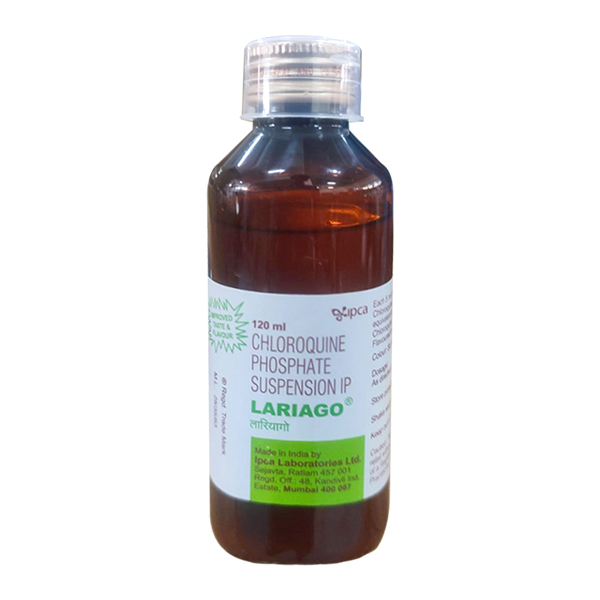
Nivaquine P 50mg Suspension
Manufacturer
Abbott
Salt Composition
Chloroquine (50mg)
Key Information
Short Description
Nivaquine P 50mg Suspension is an anti-parasitic medicine used to prevent and treat malaria caused by a mosquito bite, and may also be used to treat bowel infections in children caused by another type of parasite (amoeba).
Dosage Form
Suspension
Introduction
Nivaquine P 50mg Suspension is an antiparasitic medication that is used to treat Malaria and Amoebiasis. It works by increasing the levels of heme and pH in the red blood cells where the parasite resides. It also acts by directly interfering with the genetic material of malarial parasites thereby killing the parasite and stopping the infection from spreading.
Directions for Use
Take Nivaquine P 50mg Suspension with food to decrease the risk of stomach upset. Monitor the amounts of the different types of blood cells in your child's blood regularly. Inform your doctor if you notice unexplained bruising or bleeding, sore throat, fever, or a general feeling of tiredness in your child.
Safety Information
Side Effects
No common side effects listed.
Interacting Medicines
Leflunomide Mefloquine Penicillamine Digoxin
How it works
Nivaquine P 50mg Suspension is an antiparasitic medication that is used to treat Malaria and Amoebiasis. It works by increasing the levels of heme and pH in the red blood cells where the parasite resides. It also acts by directly interfering with the genetic material of malarial parasites thereby killing the parasite and stopping the infection from spreading.
Quick Tips
Use of mosquito repellent creams, liquids, coils, mats, etc. Do not let water accumulate in the house as it may lead to mosquito breeding. Screen the houses with wire mesh. Use bed nets at home while sleeping. Wear clothes that cover the maximum surface area of the body. Avoid spraying insect repellents on children. Lower their evening and night-time outdoor activity.
Related Medicines
Frequently asked questions
What lab test can be done to identify malaria in my child?
Your child requires laboratory testing such as a complete blood count (CBC), a blood smear test, or a malaria rapid diagnostic test for diagnosis.
My child is having a genetic deficiency of the G-6-PD enzyme. Is it safe to give Nivaquine P 50mg Suspension?
Children with G-6-PD enzyme deficiency should not receive Nivaquine P 50mg Suspension. Deficiency in this enzyme can lead to the breakdown of red blood cells, resulting in severe anemia. It is crucial to have your child's enzyme level evaluated before starting treatment.
Can other medicines be given at the same time as Nivaquine P 50mg Suspension?
Nivaquine P 50mg Suspension may interact with other medications or substances. It's important to inform your doctor about all other medications your child is taking before starting treatment.
How should Nivaquine P 50mg Suspension be stored?
Nivaquine P 50mg Suspension should be stored at room temperature in a dry, dark place away from direct sunlight or heat. Keep all medications out of reach and sight of children to prevent accidental exposure.
What is Nivaquine P 50mg Suspension and what is it used for?
Nivaquine P 50mg Suspension is an antimalarial medication prescribed for the treatment and prevention of malaria.
How long does it take for malaria symptoms to show after being bitten by an infected mosquito?
Symptoms of malaria can develop as soon as 7 days after being bitten by a mosquito carrying the parasite. Initial symptoms may appear within 7 to 18 days from the infection day (incubation period), including flu-like symptoms such as fever, chills, muscle pain, vomiting, headaches, and diarrhea.
Is it safe to use Nivaquine P 50mg Suspension for a long period of time?
If your doctor prescribes Nivaquine P 50mg Suspension for an extended duration, regular eye examinations are necessary. Chlorquine in this medication can cause blurred vision, difficulty reading (due to words disappearing), and retinopathy if taken for longer periods.
Who should not use Nivaquine P 50mg Suspension?
Inform your doctor if you have psoriasis before taking Nivaquine P 50mg Suspension, as it may worsen your condition.
What are the side effects of Nivaquine P 50mg Suspension?
Common side effects include stomach pain, nausea, vomiting, and headache. These can often be reduced by taking the medication with food.
Can chloroquine cure coronavirus (COVID-19)?
Currently, there is not enough clinical data to support the use of chloroquine in treating COVID-19. Therefore, it is crucial to consult your doctor for appropriate treatment options.
Can I take antacids along with Nivaquine P 50mg Suspension?
Take antacid at least 4 hours after giving Nivaquine P 50mg Suspension.
What is the difference between hydroxychloroquine and chloroquine?
Both hydroxychloroquine and chloroquine were first approved for malaria treatment. However, chloroquine generally leads to more side effects than hydroxychloroquine. As a result, hydroxychloroquine is frequently used today. Hydroxychloroquine is also approved for treating rheumatoid arthritis and lupus, while chloroquine is not.
How can I prevent myself from getting malaria?
To prevent malaria, take preventive measures such as covering your arms and legs to reduce mosquito bites. Use mosquito nets and insect repellent. Speak with your doctor about whether malaria prevention tablets are necessary for your trip.



